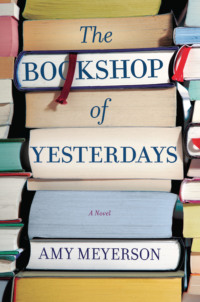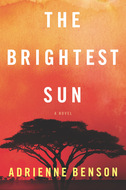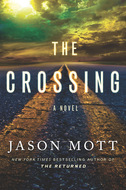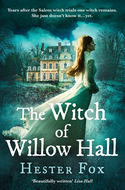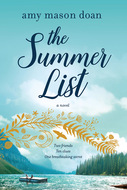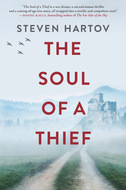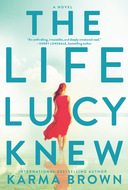Raamatut ei saa failina alla laadida, kuid seda saab lugeda meie rakenduses või veebis.
Loe raamatut: «The Bookshop Of Yesterdays»
A woman inherits a beloved bookstore and sets forth on a journey of self-discovery in this poignant debut about family, forgiveness and a love of reading.
Miranda Brooks grew up in the stacks of her eccentric uncle Billy’s bookstore, solving the inventive scavenger hunts he created just for her. But on Miranda’s twelfth birthday, Billy has a mysterious falling-out with her mother and suddenly disappears from Miranda’s life. She doesn’t hear about him again until sixteen years later when she receives unexpected news: Billy has died and left her Prospero Books, which is teetering on bankruptcy, and one final scavenger hunt.
When Miranda returns home to Los Angeles and to Prospero Books—now as its owner—she finds clues that Billy has hidden for her inside novels on the store’s shelves, in locked drawers of his apartment upstairs, in the name of the store itself. Miranda becomes determined to save Prospero Books and to solve Billy’s last scavenger hunt. She soon finds herself drawn into a journey where she meets people from Billy’s past, people whose stories reveal a history that Miranda’s mother has kept hidden—and the terrible secret that tore her family apart.
Bighearted and trenchantly observant, The Bookshop of Yesterdays is a lyrical story of family, love and the healing power of community. It’s a love letter to reading and bookstores, and a testament to how our histories shape who we become.
The Bookshop of Yesterdays
Amy Meyerson

Copyright

An imprint of HarperCollins Publishers Ltd.
1 London Bridge Street
London SE1 9GF
First published in Great Britain by HQ in 2018
Copyright © Amy Meyerson 2018
Amy Meyerson asserts the moral right to be identified as the author of this work.
A catalogue record for this book is available from the British Library.
This novel is entirely a work of fiction. The names, characters and incidents portrayed in it are the work of the author’s imagination. Any resemblance to actual persons, living or dead, events or localities is entirely coincidental.
All rights reserved under International and Pan-American Copyright Conventions. By payment of the required fees, you have been granted the non-exclusive, non-transferable right to access and read the text of this e-book on-screen. No part of this text may be reproduced, transmitted, downloaded, decompiled, reverse engineered, or stored in or introduced into any information storage and retrieval system, in any form or by any means, whether electronic or mechanical, now known or hereinafter invented, without the express written permission of HarperCollins.
Ebook Edition © June 2018 ISBN: 9781474077194
Contents
Cover
Back Cover Text
Title Page
Copyright
Epigraph
CHAPTER ONE
CHAPTER TWO
CHAPTER THREE
CHAPTER FOUR
CHAPTER FIVE
CHAPTER SIX
CHAPTER SEVEN
CHAPTER EIGHT
CHAPTER NINE
CHAPTER TEN
CHAPTER ELEVEN
CHAPTER TWELVE
CHAPTER THIRTEEN
CHAPTER FOURTEEN
CHAPTER FIFTEEN
CHAPTER SIXTEEN
CHAPTER SEVENTEEN
CHAPTER EIGHTEEN
CHAPTER NINETEEN
CHAPTER TWENTY
CHAPTER TWENTY-ONE
CHAPTER TWENTY-TWO
ACKNOWLEDGMENTS
About the Publisher
What’s past is prologue.
—The Tempest
CHAPTER ONE
The last time I saw my uncle, he bought me a dog. A golden retriever puppy with sad eyes and a heart-shaped nose. I didn’t have her long enough to give her a name. One moment she was running around my living room with the promise of many adventures together and the next she was gone. It was the same way with Uncle Billy. One moment he was waving goodbye as he reversed out of my driveway. Then I never saw him again.
Mom never wanted a dog. I’d begged her, promising to walk the dog every day, to scrub the living room rug after any accidents, but Mom was insistent. It wasn’t about the rug, or the countless shoes the dog would ruin. It wasn’t about love, either. She had no doubt I would love the dog. Of course, she would love it, too, but a pet, like any relationship, was about accountability, not love. I was on the brink of my teenage years, of boys and friends who mattered more than allowance, more than dogs, more than family. We’d been over it. No dog. I knew this. Uncle Billy knew this, too.
The dog was a birthday present. For my twelfth birthday, my parents had rented out an arcade and batting cages in Culver City. It was the beginning of 1998. We always celebrated in January, since I was born so close to the end of the year.
My friends crowded behind the plate, cheering as I nudged the batting helmet out of my face and timidly stepped into the cage. Dad offered me last-minute advice to keep my feet shoulder-distance apart, my right elbow up. I expected Mom to remind me to be careful, but she was at the concession stand, making a phone call.
All right, Miranda, you can do this, Dad said after a swing and a miss. Mom appeared at his side and whispered something into his ear. I swung at the next pitch once it had already sped past the plate. You should know by now not to count on him, Dad said to Mom. Miranda, he called to me. Keep your eyes open.
He promised he’d be here, I heard Mom whisper.
Let’s not get into this now, he whispered back.
He shouldn’t make promises if he isn’t going to keep them.
Suze, not now.
I tried to focus on my cocked elbow, my loose knees, just as Dad had taught me, but their hushed tones distracted me. There was only one person who made them whisper like that. I hated when they talked about Billy that way, like they were trying to protect me from him, like he was someone I needed to be shielded from. I turned away from the pitching machine, toward my parents. They were leaning against the cage, staring each other down.
The impact sounded before I felt it. An incredibly loud clap and then my shoulder ignited. I screamed, falling to the ground. Two more balls whizzed by my head. Dad shouted for someone to turn off the machine as he and Mom raced into the cage.
Sweetheart, are you okay? Mom pulled the helmet off my head and brushed the sweaty hair off my forehead. The pain had knocked the wind out of me. I panted on the cold cement floor, unable to respond. Miranda, talk to me, she said a little too frantically.
I’m okay, I said between exerted breaths. I think I just need some cake.
Normally, this would have made them laugh, but they continued to cast concerned and disappointed looks at each other as if the welt rising on my shoulder was somehow Billy’s fault, too. Mom huffed at Dad, then stormed off to the concession stand to collect my birthday cake.
Is Mom okay? I asked Dad as we watched her talk to the teenager behind the counter.
Nothing a little cake can’t fix, Dad said, ruffling my hair.
After the cake was devoured and the bag of ice Mom made me hold on my shoulder had melted down the front of my T-shirt, I joined my friends in the arcade, ignoring the sharp pains that shot down my arm as I rolled the skee-ball up its narrow lane. Between rolls, I glanced over at my parents. They were cleaning up the remains of my birthday cake, Mom furiously scrubbing the plastic tablecloth until Dad pulled her away and held her in his arms. He stroked her hair as he whispered into her ear. I couldn’t understand why she was so upset. Billy often didn’t show up when he said he would. In fact, I couldn’t even remember the last time he’d been to one of my birthday parties. If an earthquake hit in Japan or Italy, he’d be on the first plane out with the other seismologists, engineers, sociologists. He didn’t usually have time to let us know he was leaving. Instead of disappointment, I felt pride. My uncle was important. My uncle saved lives. Mom taught me to see him this way. After a recital or debate, a Sunday barbecue without Billy, she would tell me, Your uncle wants to be here, but he’s making the world a safer place. He was my superhero. Captain Billy, who saved the world not with superhuman powers but with a superior brain. Even when I was too old to believe in superheroes, I still believed in Billy. I thought Mom believed in him, too, yet there she was, crying over a birthday party.
* * *
My best friend, Joanie, and I went to bed early that night. I was half-asleep and hazy, but the ringing doorbell was real, the tiptoes downstairs, the whispers. I slipped out of bed, into the hall where I saw Mom at the front door below, her satin bathrobe pulled snugly around her small frame. Billy stood outside on the porch.
I started to run toward the stairs, ready to pounce on Billy. I was getting too big to jump on him, yet I thought even when I was an adult I would greet him that way, breaking his back with my love for him. When I got to the top of the stairs, Mom’s words startled me.
